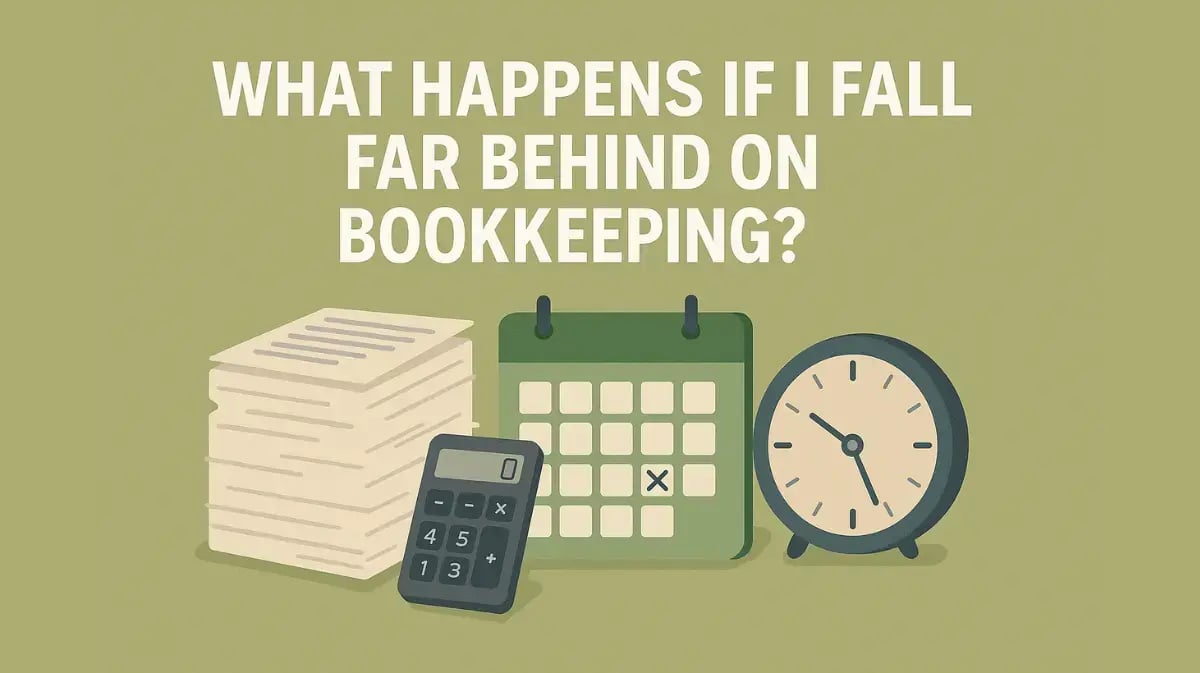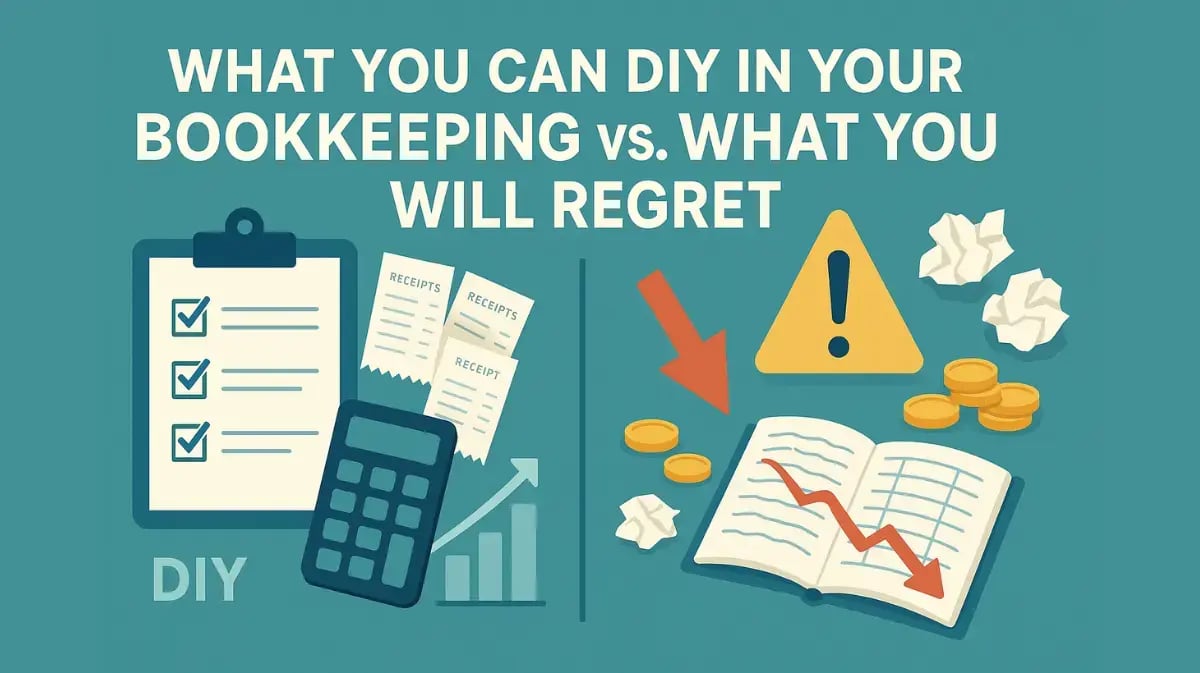What Happens if I Fall Far Behind on Bookkeeping?
August 21st, 2025
6 min read

Falling behind on bookkeeping isn’t something most business owners plan to do. It just sort of happens. One missed week turns into a missed month. Then, before you know it, you're staring at a pile of receipts, unentered invoices, and unanswered questions from your tax preparer. Sound familiar?
If you’re a business owner who’s months or even years behind on your books, you’re definitely not alone. In fact, it’s one of the most common challenges small business owners face, especially in the early years. With so much to manage, employees, customers, inventory, and vendors, it’s easy for financial records to fall to the bottom of the to-do list.
But here’s the truth: what starts as a minor delay can quietly snowball into a bigger problem. Falling far behind on your books can lead to poor financial decisions, surprise tax bills, and unnecessary stress. It can even slow down your business growth.
This article will walk you through what really happens when you fall behind on bookkeeping, the hidden risks it creates, and most importantly, how to catch up and get back on solid ground without burning out or blowing your budget.
What Does “Falling Behind” Look Like?
Bookkeeping is more than just data entry—it’s how you keep track of the financial health of your business. It tells you how much money is coming in, where it’s going, and whether your business is actually making a profit. When bookkeeping slips through the cracks, that visibility disappears, and the risks start to multiply.
But falling behind doesn’t always mean you’ve abandoned your books entirely. Sometimes, the signs are subtle at first and easy to ignore.
Here are a few common ways business owners fall behind:
- You haven’t categorized expenses in months.
- You’re behind on reconciling bank or credit card accounts.
- You’ve got a backlog of receipts you haven’t entered.
- Invoices were sent, but you're not sure who paid and who didn’t.
- You’re avoiding your accounting software altogether.
If any of these sound familiar, chances are you're already behind. And if it’s been more than 90 days since your books were fully up to date, it’s no longer just a “to-do”—it’s a business risk. The longer you wait, the more complicated (and costly) it can become to clean things up.
The good news? You can absolutely recover, and we’ll show you how in the sections ahead.
Why Falling Behind Is a Bigger Deal Than You Think
It’s easy to treat bookkeeping as something you’ll “get to eventually.” For many business owners, it feels like background work—something that can wait until after the rush dies down.
But accurate, up-to-date books aren’t just paperwork. They’re essential to knowing whether your business is healthy or headed for trouble. Without them, you’re forced to make important decisions based on gut instinct or outdated numbers.
Falling behind may seem harmless at first, but it can lead to costly mistakes, missed opportunities, and growing stress. The longer you wait, the harder and more expensive it becomes to catch up.
Here’s what can happen if you keep putting it off.
1. You Can’t Make Smart Decisions Without Clear Numbers
When your books are out of date, you’re flying blind. You don’t know what you’re spending, what you’re earning, or how much cash you actually have.
This can lead to:
- Overspending without realizing it.
- Hiring when you can’t afford it.
- Missed opportunities because you’re not confident in your numbers.
2. Tax Time Gets a Whole Lot Worse
When it’s time to file income taxes, messy or missing books can:
- Delay your filing.
- Result in overpaying or underpaying.
- Trigger avoidable penalties.
Even worse? Rushing to pull everything together in a panic often leads to errors and missed deductions.
3. You Risk Penalties for Payroll or Sales Tax Mistakes
If you handle payroll or sales tax, falling behind on bookkeeping can cause you to:
- Miss important payment deadlines.
- Underreport or overreport income.
- Accidentally file incorrect forms.
This can mean fines, interest charges, and even audits. The longer it goes unchecked, the worse it can get.
4. It Creates Mental Clutter and Decision Fatigue
One of the most underrated consequences of falling behind is the mental energy it consumes.
Even if you’ve pushed it to the back burner, you’re likely still thinking about it:
- “I should really do the books.”
- “I hope I don’t get a letter from the IRS.”
- “What if I forgot something important?”
The stress compounds over time, and it becomes harder to take action the longer you wait.
5. It Can Stall Business Growth
Outdated or missing financial records make it hard to:
- Apply for loans or business credit.
- Get accurate pricing on insurance or lease agreements.
- Know if you can afford to grow, hire, or invest.
In short, messy books make it nearly impossible to scale with confidence.
How Do You Fix It?
If you're months, or even a year or more, behind on your bookkeeping, you're not alone. And no, it’s not too late to turn things around. But getting caught up won’t happen by accident. It takes a focused plan, some effort, and the right kind of support.
The good news? You don’t have to fix everything all at once. With a step-by-step approach, you can untangle the backlog and put a system in place that actually works for your business.
Here’s how to get started.
Be Honest About How Far Behind You Are
Start by asking:
- What was the last month everything was updated?
- Have all transactions been recorded since then?
- Are payroll and taxes current?
It’s okay if the answer is “I don’t know.” This is simply about assessing the situation so you can make a plan.
Gather the Essentials
To catch up, you (or someone helping you) will need:
- Business bank statements.
- Credit card statements.
- Receipts (paper and digital).
- Invoices (sent and received).
- Payroll reports.
- Loan documents (if applicable).
Pro tip: If you’re missing receipts, many vendors can resend them or provide summaries. Don't let that stop you from moving forward.
Get Help If the Pile Is Too Big
At a certain point, it becomes more efficient and less stressful to bring in professional help. A bookkeeper or accounting support team can help you:
- Recreate months of missing financial data.
- Reconcile accounts accurately.
- Flag any tax or payroll compliance issues.
- Get your system back to “current.”
This kind of “catch-up” work is often referred to as backwork and is a routine part of bringing on new clients for bookkeeping services.
Choose the Right Tools
If you’ve been trying to manage your books using spreadsheets, it might be time for an upgrade. Software like QuickBooks Online or Xero can automate a lot of the process, including:
- Bank feeds that pull in transactions automatically.
- Rules to categorize expenses.
- Invoicing and payment tracking.
Technology doesn’t replace good bookkeeping habits, but it definitely makes them easier to stick to.
Put a System in Place to Stay Caught Up
Once you’ve caught up, you don’t want to fall behind again. The best way to avoid this is to create a simple, repeatable process:
- Set a weekly “money meeting” with yourself (or your team).
- Reconcile accounts monthly.
- Track unpaid invoices and follow up regularly.
Whether you do this yourself or have someone else do it, consistency is key.
Take the First Step, Then Keep Moving
If you’re behind on your books, the worst thing you can do is keep ignoring it. Avoiding the problem won’t make it go away. In fact, the longer you wait, the more complicated and costly it can become.
But here’s the good news: progress starts with one small step. You don’t have to fix everything in a day. You just need to begin.
Here are a few simple actions you can take today:
- Set aside 30 minutes to review your bank or credit card statements.
- Make a short list of what’s missing or out of date.
- Look at your accounting software, even if it’s messy.
- Reach out for help if you’re overwhelmed or unsure where to start.
You’ll be surprised how quickly momentum builds once you start moving. Every step you take brings you closer to clarity, control, and confidence in your business finances.
You Don’t Have to Tackle This Alone
Running a small business is demanding enough without the added stress of financial records piling up. But no matter how far behind you are, there is a way forward, and it’s probably simpler than you think.
Catching up on your books doesn’t have to feel overwhelming. With the right support and a step-by-step plan, you can clean things up, regain clarity, and finally stop wondering what’s lurking in your numbers.
At TMA Accounting, we help small business owners like you get caught up, stay compliant, and build systems that make bookkeeping easier going forward, not harder. If you’re ready to stop avoiding your books and start feeling confident about your finances, we’re here when you’re ready.
Let’s talk. Schedule a free call today to learn how we can help you clean up your books and take back control of your finances.
Blog Disclaimer: Nothing in this post constitutes legal, tax, or financial advice and is intended for informational and educational purposes only. This informational and educational material is not intended, and must not be taken, as legal, tax, or financial advice on any particular set of facts or circumstances or as recommendations that are suitable for any specific person. You need to contact a lawyer, accountant, or financial adviser licensed in your jurisdiction for advice on your specific questions, issues, and concerns. View our full Terms of Use here.
Topics:













